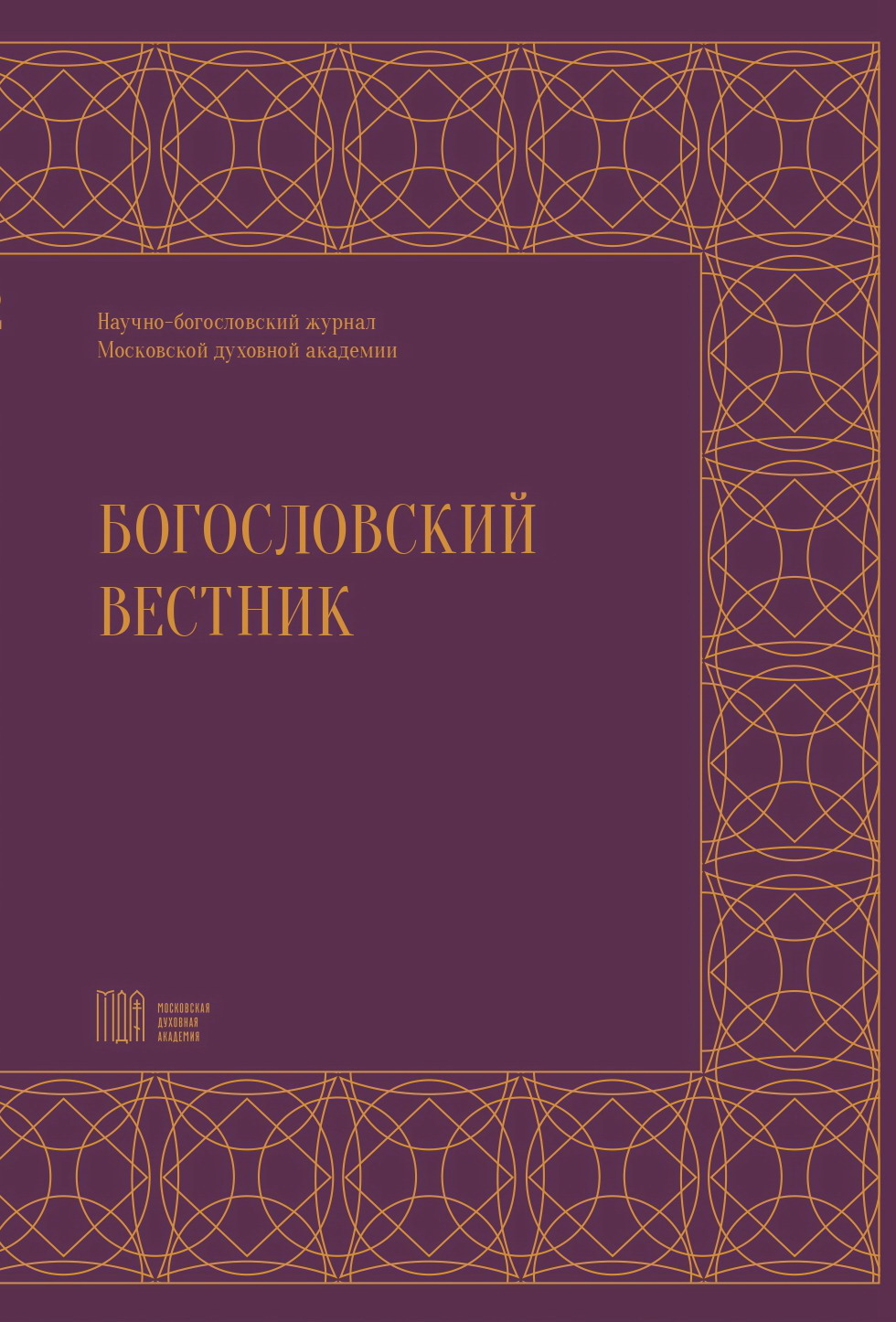The Reconstruction of the Theological Gnoseology of St. Peter Damascene. Part 2: Anthropology of God-Cognition
DOI:
https://doi.org/10.31802/GB.2025.57.2.009Keywords:
St. Peter of Damascus (Peter Damascene), dogmatic interpretation, gnoseology, cognition, knowledge, cognition of God, anthropology, natural knowledge, ontological status of knowledge, synergy, natural and supernatural cognition, assimilation to GodAbstract
The article continues the analysis of the conceptual apparatus of St. Peter of Damascus describing cognitive activity. Knowledge is analyzed by its source, or method of acquisition, and is divided into conditionally natural and supernatural, i.e., that which exceeds the natural capabilities of man. Any kind of knowledge turns out to be theological and a manifestation of the synergy of God and man. The types of knowledge identified in St. Peter’s system are further classified by their ontological status, i.e., their relationship to the levels of human existence. Informational, experiential, and mystical (or contemplative) knowledge are distinguished — three types that partially correspond to the three types of faith distinguished by St. Ignatius (Brianchaninov). Particular attention is drawn to the concept of primordial, preliminary knowledge, called natural knowledge and granted to man as the primary condition for the possibility of salvation. In his concept of natural knowledge, St. Peter relies significantly on the teachings of St. Isaac the Syrian. True knowledge manifests itself in a unique way in a person, transforming all the powers of the soul and producing a likeness to God.
Downloads
References
Gregorius Nyssenus. De virginitate // PG. T. 46. Col. 317-416.
Evagrius Ponticus. Capita practica ad Anatolium // PG. T. 40. Col. 1219-1252.
Evagrius Ponticus. De malignis cogitationibus // Évagre le Pontique. Sur les pensées / éd. P. Géhin, C. Guillaumont, A. Guillaumont. Paris: Cerf, 1998. (Source crétiennes; 438). P. 148-301.
Isaacus Ninivita. Sermones ascetici // Τοῦ Ὁσίου Πατρὸς ἡμῶν Ἰσαάκ Ἐπισκόπου Νινεύι τοῦ Σύρου τὰ εὐρεθέντα ἀσκητικά / ἀξιώσει μὲν τοῦ Μακαριωτάτου Θειοτάτου καὶ Σοφωτάτου Πατριάρχου τῆς Ἁγίας Πόλεως Ἱερουσαλήμ καὶ πάσης Παλαιστίνης Κυρίου Κυρίου Ἐφραίμ, ἐπιμέλεια δὲ Νικηφόρου ἱερομονάχου τοῦ Θεοτόκου, ἤδη πρῶτον τύποις ἐκδοθέντα. Ἐν Λειψία τῆς Σακσονίας: Ἐν τῇ τυπογραφία τοῦ Βρεϊτκόπφ, 1770. Σ. 1-584.
Johannes Climacus. Scala Paradisi // PG. T. 88. Col. 631-1164.
Petrus Damascenus. Admonitio animae suae // Φιλοκαλία τῶν ἱερῶν νηπυικῶν. Τ. Γ´. Ἀθῆναι: Ἀστήρ, 1991. Σ. 5-111.
Petrus Damascenus. Orationes XXIV alphabeticae // Φιλοκαλία τῶν ἱερῶν νηπυικῶν. Τ. Γ´. Ἀθῆναι: Ἀστήρ, 1991. Σ. 112-168.
Евагрий Понтийский. Главы о деятельной жизни к Анатолию // Добротолюбие в русском переводе. Т. 1. Москва: Тип. И. Ефремова, 1895. С. 569-584.
Игнатий (Брянчанинов), свт. Поучение 2-е в неделю по Богоявлении. О покаянии // Игнатий (Брянчанинов), свт. Сочинения. Т. 4: Аскетическая проповедь и письма к мирянам. Санкт-Петербург: Изд. И. Л. Тузова, 1886. С. 11-19.
Игнатий (Брянчанинов), свт. Поучение в неделю Антипасхи. О христианстве // Игнатий (Брянчанинов), свт. Сочинения. Т. 4: Аскетическая проповедь и письма к мирянам. Санкт-Петербург: Изд. И. Л. Тузова, 1886. С. 140-149.
Иже во святых отца нашего Аввы Исаака Сириянина. Слова подвижнические. Москва: Правило веры, 1993.
Иоанн Лествичник, прп. Лествица. Санкт-Петербург: Светословъ, 1996.
Преподобного Петра Дамаскина творения: краткое изложение священного трезвения. Москва: Правило веры, 2021.
Триодь Постная: в 2 частях. Часть 1. Черновцы: Издательство Киевской Митрополии УПЦ, 2001.
Бабаева А. В., Каравашкина Н. Е. Православная концепция познания // Современные научные исследования и инновации: электронный журнал. 2016. № 11. URL: (дата обращения: 26.05.2024).
Болотова Е. А. Проблема человекоразмерности научной методологии // Сретенское слово. 2023. № 4 (8). С. 31-45.
Горшенин М. А. Антропологическое и сотериологическое измерение Богопознания в учении свт. Игнатия (Брянчанинова). URL: (дата обращения: 07.09.2023).
Горшенин М. А. Практический апофатизм и самоотречение как основной принцип вхождения в Богообщение и Богопознание в системе свт. Игнатия (Брянчанинова). URL: (дата обращения: 31.01.2024).
Горшенин М. А. Реконструкция богословской гносеологии св. Петра (Дамаскина). Ч. 1: Прп. Пётр Дамаскин как гносеолог // Богословский вестник. № 1 (56). С. 95-112.
Никон (Котов), иерод. Духовно-нравственное учение преподобного Петра Дамаскина: дис. … канд. богословия. Сергиев Посад: МДА, 2006.
Gabriel (Bunge), Schema-Archimandrit. Drachenwein und Engelsbrot: Die Lehre des Evagrios Pontikos von Zorn und Sanftmut. Beuron: Beuroner Kunstverlag, 2018.
Gouillard J. Un auteur spirituel byzantin du XIIe siècle: Pierre Damascène // Échos d’Orient. 1939. Vol. 38. № 195-196. P. 257-278.
Peters G. «A Treasury of Divine Knowledge and Wisdom»: The Twelfth-Century Byzantine Spiritual Theology of Peter of Damascus. PhD Thesis in Theology. Toronto: Univ. of St. Michael’s College, 2003.
Downloads
Published
How to Cite
Issue
Section
Categories
License

This work is licensed under a Creative Commons Attribution-ShareAlike 4.0 International License.








